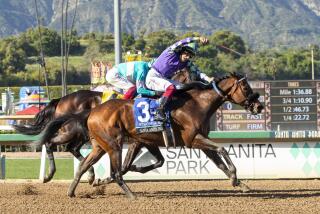Once Again, Lester Piggott Is Making Headlines : Accusations Surface Regarding the Financial Affairs of Retired British Jockey
LONDON — As one of horse racing’s most celebrated jockeys, Lester Piggott had many a rough ride during his 38-year-career, but none matched the bumpiness he has encountered in the 21 months since his retirement.
The crusty, 11-time British national champion jockey had no sooner launched his new career as a trainer after his final race as a jockey in October 1985, than the first indications of scandal relating to his financial affairs began to surface.
An investigation into alleged unpaid back taxes was believed to have cost him an immediate knighthood a year ago. Then, last December, an astonished, disillusioned British public watched as the man once dubbed “the housewives’ favorite jockey” was arrested on charges of tax fraud totaling nearly $6 million.
Piggott’s lawyers have said that he had already paid roughly $3 million to central tax authorities.
Freed on bail of nearly $1.5-million, Piggott was slapped with another charge last March of evading value-added tax--a form of sales tax--of nearly $300,000 on an array of business transactions. The tax, a flat 15%, is applied to most purchases and formal transactions in Britain.
Piggott’s trial on 12 separate charges of tax fraud is scheduled for October in London’s Central Criminal Court. Sentences for tax fraud vary widely in Britain, but stiff fines and prison sentences of several years are not uncommon.
As if all this weren’t enough, last weekend a national newspaper printed allegations of professional misconduct against Piggott, claiming that he frequently bet on races as a jockey, including occasional wagers against himself.
Regulations set down by the ruling body of British racing, the Jockey Club, prohibit jockeys from betting if they are licensed riders.
The Sunday tabloid, the People, which first printed the accusations last Sunday, claimed that it had tape-recorded evidence of Piggott directing a friend to place the bets on his behalf.
In one instance, Piggott purportedly asked a colleague to place 10-pound (about $16) bets to win on a three-race triple. Two of the named horses won, one of them ahead of Piggott’s own mount.
Although alleged incidents are believed to have occurred up to 10 years ago, Jockey Club officials confirmed Thursday that they would launch at least a preliminary investigation.
“Any allegations of this nature must be investigated,” said Peter Twite, chief administrator of the Jockey Club. “If proven, we would view it as serious.”
According to Jockey Club officials, the newspaper has promised to make the tapes available to the club’s security department, which will then recommend to club stewards whether to conduct a formal disciplinary hearing.
Theoretically, Piggott could be fined up to $5,600 and banned indefinitely from training if found guilty in such a hearing. However, officials indicated such a result would be highly unlikely.
“If he were still a licensed jockey, there would almost certainly be a disciplinary inquiry,” said Jockey Club spokeswoman Monica Dixon. “But he has been retired for nearly two years, and all this supposedly took place 10 years ago. They might decide it’s not worth pursuing.”
There is no regulation in Britain preventing trainers from betting.
Jockey Club officials also stressed that the most recent allegations constitute no breach of British law.
Neither Piggott nor his attorney was available for comment on the newspaper’s allegations Thursday, but the People, in its original story, quoted Piggott as discounting the charges.
The extent of Piggott’s troubles have clouded what racing observers describe as a successful transition to becoming a trainer, including a winner at the Royal Ascot meeting in June.
“He’s made the jump much better than most jockeys who have tried,” noted Jeremy Chapman, deputy editor of the prominent British racing daily, Sporting Life.
During his colorful career, Piggott rode 5,191 winners, including 29 in so-called classic races, the five annual English racing events carrying a degree of prestige similar to the Triple Crown races in the United States.
Those who rode against him claimed that he had an intuitive feel for his mounts and was equally adept at finessing a delicate filly or handling a veteran horse that needed an iron hand.
In a nation that has historically venerated fair play above victory, Piggott was one of the fiercest competitors in all of British sports. He rode his first winner at the age of 12 and during his formative years endured frequent suspensions for rough riding.
On the day of Piggott’s retirement, former British champion jockey Doug Smith recalled an incident during a tight stretch drive. Smith recounted that as he began to push ahead, Piggott reached out and hit him with his whip.
“By the time I had got back to the weighing room, I had a large lump on the back of my head,” Smith said.
Now, a court will decided whether it’s Piggott’s turn to take the lumps.
More to Read
Go beyond the scoreboard
Get the latest on L.A.'s teams in the daily Sports Report newsletter.
You may occasionally receive promotional content from the Los Angeles Times.










